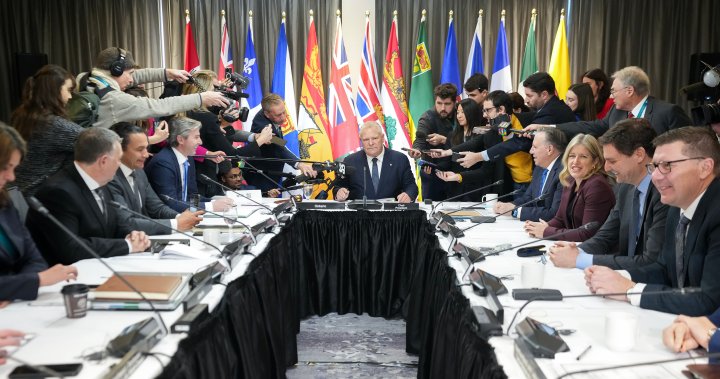The Call for Provincial Leadership in Canada-U.S. Relations
Ontario Premier Doug Ford has asserted the need for Canada’s premiers to play a more significant role in managing Canada-U.S. relations, particularly in light of potential trade challenges posed by the incoming U.S. administration. This call for enhanced provincial involvement comes amidst concerns over proposed tariffs and the need for a coordinated national strategy. Ford emphasizes the direct impact of trade policies on individual provinces and territories, highlighting the importance of provincial voices being heard in discussions and negotiations. His comments suggest a shift towards greater provincial autonomy in international relations, potentially reflecting a perception that the federal government is preoccupied with other pressing matters.
Divergent Provincial Approaches to Trade Challenges
While Ford advocates for a firm stance, including retaliatory tariffs, against potential U.S. protectionist measures, other premiers have expressed differing views on the optimal approach. Alberta Premier Danielle Smith, for instance, favors a diplomatic approach, eschewing retaliatory measures that could negatively impact Alberta’s energy exports. This divergence in perspectives underscores the complex interplay of provincial interests and priorities in navigating international trade relations. Ford’s remarks acknowledge the autonomy of individual provinces to pursue their own strategies while emphasizing the collective need for a unified front on certain issues like border security and defense spending.
Focus on Border Security and Defense Spending
Despite differing approaches to trade negotiations, Ford stresses a consensus among premiers on the importance of strengthening border security and increasing defense spending. He highlights these as critical areas where collaborative federal-provincial action is necessary to protect Canadian interests. The call for increased defense spending aligns with NATO targets, although the timeline for achieving this goal remains a point of discussion. This emphasis on security reflects the evolving geopolitical landscape and the need for Canada to assert its sovereignty and protect its economic interests.
Bilateral Trade Agreements and Addressing Economic Vulnerabilities
Ford also advocates for pursuing a bilateral trade deal with the United States, suggesting concerns about the existing trilateral agreement with Mexico. He raises the issue of Mexico potentially becoming a conduit for Chinese goods, impacting North American markets. This perspective underscores the broader complexities of international trade and the need for strategic adjustments to protect domestic industries. The call for a bilateral agreement reflects a desire for more direct engagement with the U.S. and potentially greater control over trade terms.
The Role of Interprovincial Collaboration
The premiers’ meeting serves as a platform for interprovincial collaboration and strategy development in addressing shared challenges related to Canada-U.S. relations. The agenda encompasses a range of critical issues, including trade, energy security, and healthcare. This focus on collaborative action highlights the importance of provincial cooperation in navigating complex international relationships and advocating for shared interests. By working together, the premiers aim to strengthen Canada’s position in trade negotiations and address critical national priorities like healthcare.
Navigating a Complex Geopolitical Landscape
The emphasis on provincial involvement in international relations reflects the increasingly complex global landscape and the need for a multifaceted approach to protecting Canadian interests. The premiers’ discussions underscore the importance of balancing national priorities with regional concerns and finding common ground for effective action. As Canada navigates evolving trade dynamics and geopolitical challenges, the role of provinces in shaping international relations is likely to become increasingly prominent. The premiers’ meeting marks a significant step towards a more coordinated and assertive approach to engaging with the U.S. and protecting Canadian interests on both national and provincial levels.

